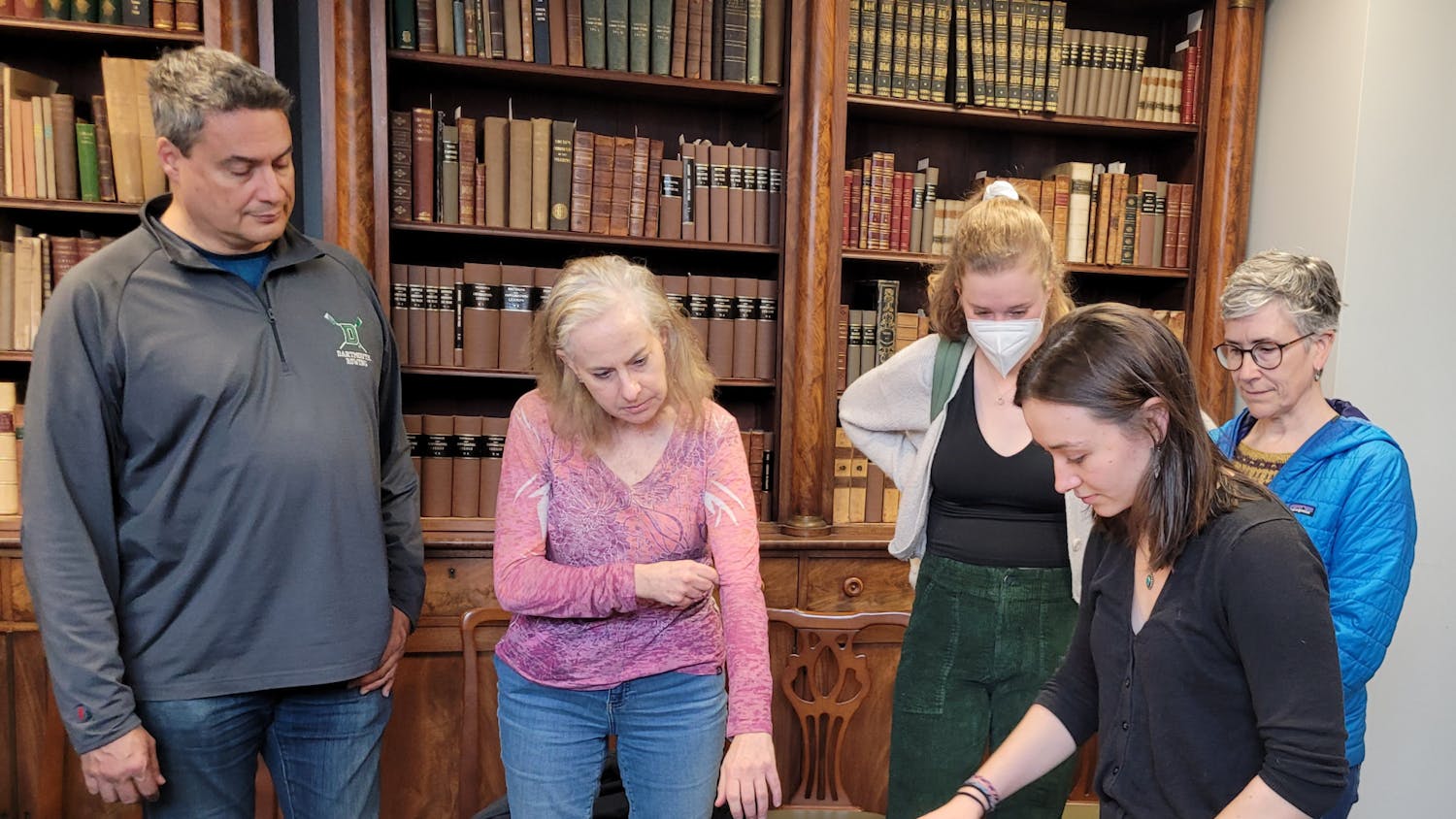At the Oscars this year, Lady Gaga performed an emotionally-charged rendition of her song “Til it Happens to You.” Nearing the end of her performance, she was joined onstage by a group 50 young survivors of sexual violence that included two alums: Nastassja Schmiedt, a former member of the Class of 2015, and Lea Roth ’13.
Gaga’s song addresses the sensitive topic of sexual violence and is featured in the documentary “The Hunting Ground” (2015), a film that specifically addresses sexual violence on American college campuses. An interview with Schmiedt was featured in the documentary.
Schmiedt said that they found out they were invited to appear on stage with Lady Gaga just weeks before the event. The two were in Italy at the time and did not know how they could arrange a flight to Los Angeles on such short notice. Eventually, Schmiedt said, a generous donor covered their travel expenses.
Roth said that they and Schmiedt traveled the furthest out of all the survivors on stage.
“This was basically the biggest activist statement the Oscars had ever had,” Schmiedt said. “It was Lady Gaga’s desire to make a statement.”
The importance of this statement became evident when they met her, Schmiedt said, as Lady Gaga hugged every one of the survivors.
Roth said they felt honored to be part of the performance, and added that it was extraordinary that the event acknowledged survivors of sexual violence in a positive way.
Schmiedt also said, however, that some of the reactions to their involvement in the performance have been a bit “off color,” with many people telling them how lucky they were.
“We had to go through some really horrible things to have this opportunity,” they said. “I’m sure all of us would have given up this opportunity if it meant not being sexually assaulted.”
Roth said that they hoped the public display at the Oscars will encourage other survivors to be open about their experiences and increase support and understanding more broadly.
Roth said that for them, the most powerful aspect of Lady Gaga’s performance was her emotional vulnerability, rawness and honesty while sharing her experience.
Schmiedt added that they really appreciated the honesty and anger that came with the performance, especially because survivors can have a lot of anger from being told what to do and how to react to their traumatic experiences. It was not just a sad song but a song that operates on many layers, they added.
Schmiedt and Roth co-founded Time to Spring Up in 2013, a company that uses multimedia to create a space for sexual violence learning and healing, after they participated in the Real Talk Dartmouth Dimensions show protest in 2013.
“We just felt very discouraged by a lack of imagination in terms of how students can organize and what forms of healthy community we can imagine,” Roth said.
They said that they wanted to start making art and fiction to express this positive vision of what our society can be and how millennials can connect.
The two alumni have also authored “Millennial Sex Education: I’ve Never Done This Before” (2015) together, a collection of short stories and questions that explore issues of sexuality. The book is fictional, which allowed Roth and Schmiedt to avoid having to use the stories of real people.
Roth said that one of the objectives of “Millennial Sex Education” is to differentiate consensual sexual experience from rape and sexual assault, adding that consenting to one act does not mean being open to everything.
Susy Struble ’93, founder of Dartmouth Change, a non-profit sexual assault advocacy group, said she found Lady Gaga’s performance profoundly moving.
Struble said that this Oscars performance shows victims recovering from trauma that they are not alone and could help spur some conversations in people’s homes.
Myka Held, the staff attorney for the advocacy group SurvJustice, said that she did not think anyone could see Lady Gaga’s performance and not be moved by it. Held noted her disappointment that media coverage of sexual assault college activists has been fading, but added that Lady Gaga’s performance could bring the topic back to the forefront and remind viewers that sexual assault often affects people around them.
Caroline Heldman, Occidential College professor and co-founder of End Rape on Campus and Faculty Against Rape, helped organize the survivors who appeared onstage with Gaga. She said she met Schmiedt and Roth in New York when they were doing Clery Act-related work together.
Heldman said that the idea to have sexual assault survivors onstage came from “The Hunting Ground” team and her work organizing the survivors involved contacting people she had worked with.
Regarding Gaga’s Oscars performance, Heldman said it demonstrated how many people are affected by sexual violence as well as the resolve of survivor activists to change rape culture.
“Not only was it an incredible moment in the history of the campus anti-rape movement, but also in Oscar history,” Heldman said.
Roth noted that people who identify as LGBT are twice as likely to be assaulted and that people of color are also assaulted at much higher rates.
“A lot of the news coverage has been now that people have come forward, hopefully more people will report,” Schmiedt said. “I don’t think that the reporting system is always the best response for a survivor.”
They said that oftentimes reporting to the institution or to the police can be much more traumatizing for the survivor.
“I don’t want people to feel ashamed for not reporting to the police or authorities,” Schmiedt said.
Schmiedt said that at the College, there is a tendency for students to create a “perfect narrative” and to put on a problem-free, insular facade.
However, it is important to acknowledge what is going on outside of your personal experience, they said.
Struble said that Dartmouth’s approach to addressing the issue of campus sexual violence needs to be driven by a completely independent committee of experts. Each campus has its unique culture, she said, and the outline of the solution should be defined by experts, adding that the entire Dartmouth institution is part of the problem.
“It’s much broader and deeper institutionally than just a couple of bad apples,” Struble said. “It’s our long time commitment to financing and resourcing efforts and how we speak about and frame the problem.”
In June 2014, the College changed its policy to make expulsion the mandatory sanction for students found guilty of sexual assault. Moving Dartmouth Forward implemented a four-year sexual violence prevention and education program for students and a first-responder training for faculty and staff, which was piloted in the fall of 2015.
Roth said they are very supportive of the Callisto platform, which is a third-party sexual assault recording and reporting website.
Held said that from her experience, many colleges have recently been “talking the talk” but are not actually doing anything.
Colleges need to hire staff members and Title IX coordinators who can help support survivors, Held said.
Heldman believes that every state needs an affirmative consent policy where both parties have to demonstrate that they received explicit consent. She added that many cases of sexual violence are perpetrated by serial rapists, and emphasized the necessity of colleges expelling rapists and perpetrators of sexual violence.
Schmiedt and Roth said they are excited to be publishing another book in the coming month, titled “Campus Violence Workbook,” which discusses the issue of campus violence in terms of sexual violence, hazing and institutional violence.
“I think that it’s very important for students of all identities to support each other, to express themselves, to not lose themselves within the Dartmouth bubble,” Roth said. “We need to be honest with each other about our experiences.”
Sonia is a junior from Ottawa, Canada. (That is the mysterious Canadian capital that no one seems to ever have heard of.) She is a double major in Economics and Government, with a minor in French. She decided to join The D’s news team in her freshman fall because of her love of writing, talking to people, getting the most up-to-date news on campus, and having a large community of fellow students to share these interests with.



